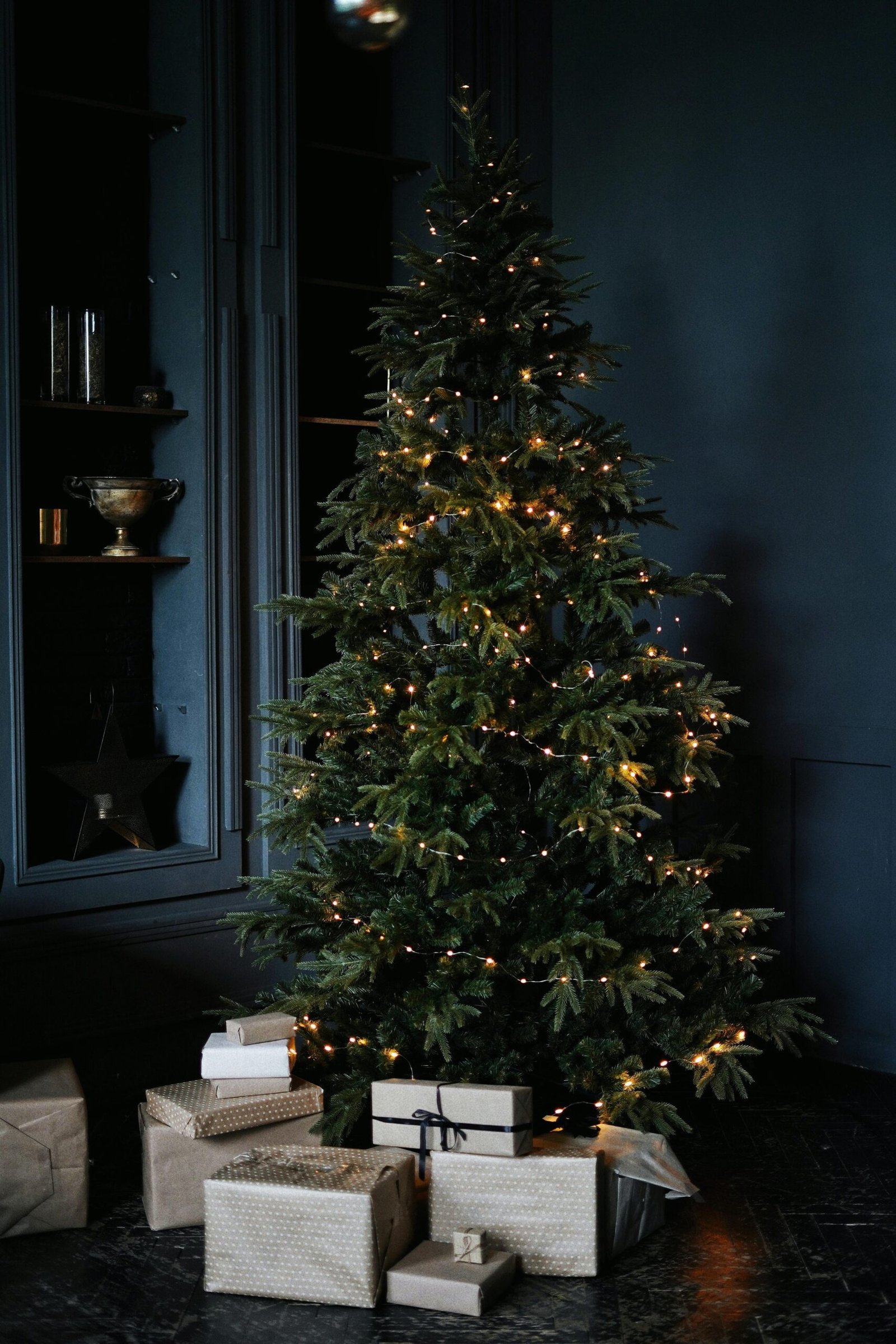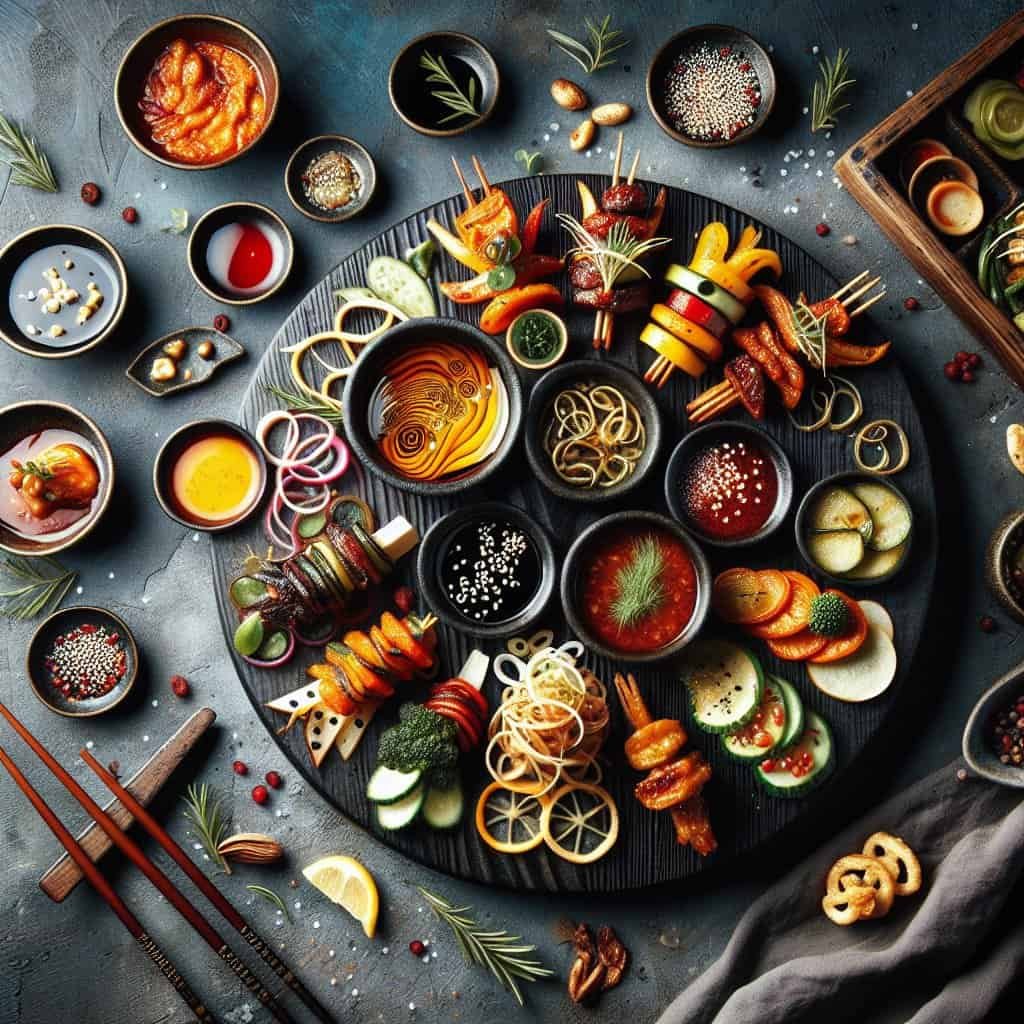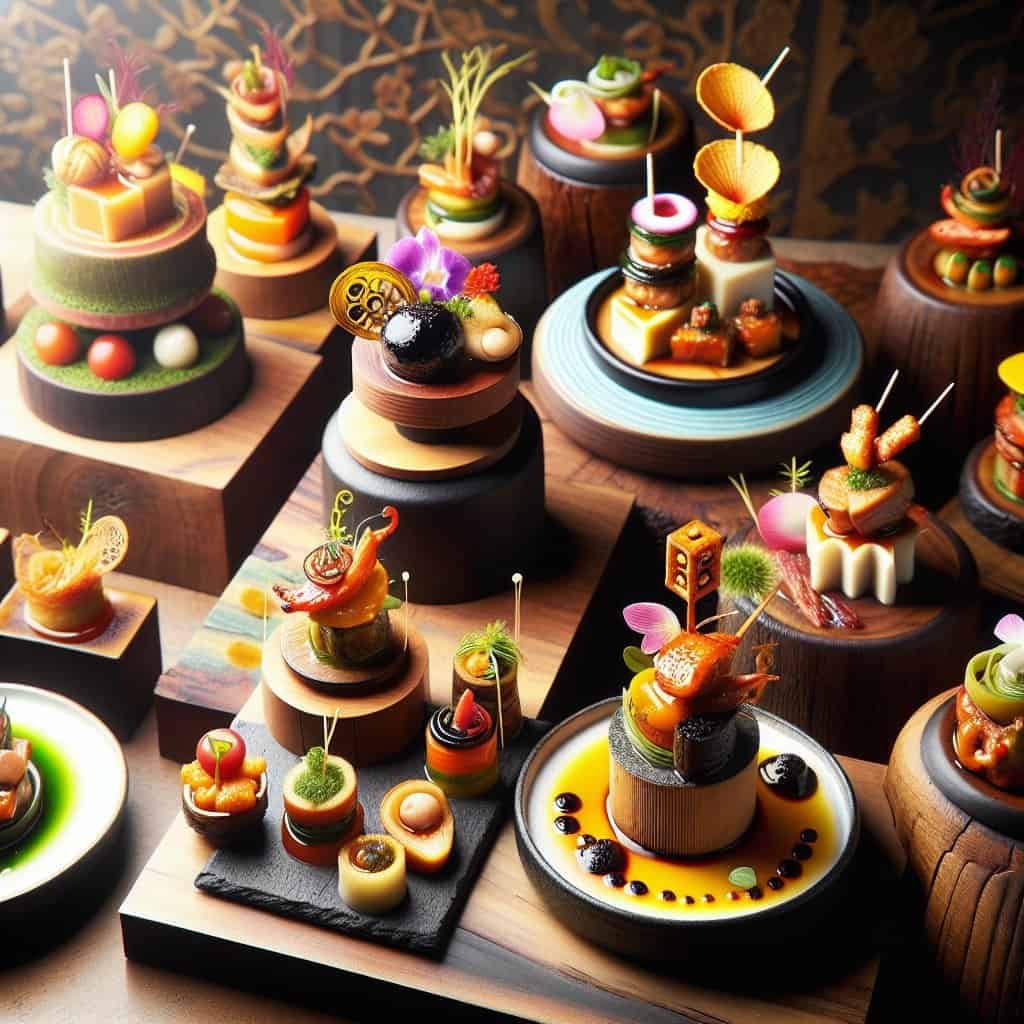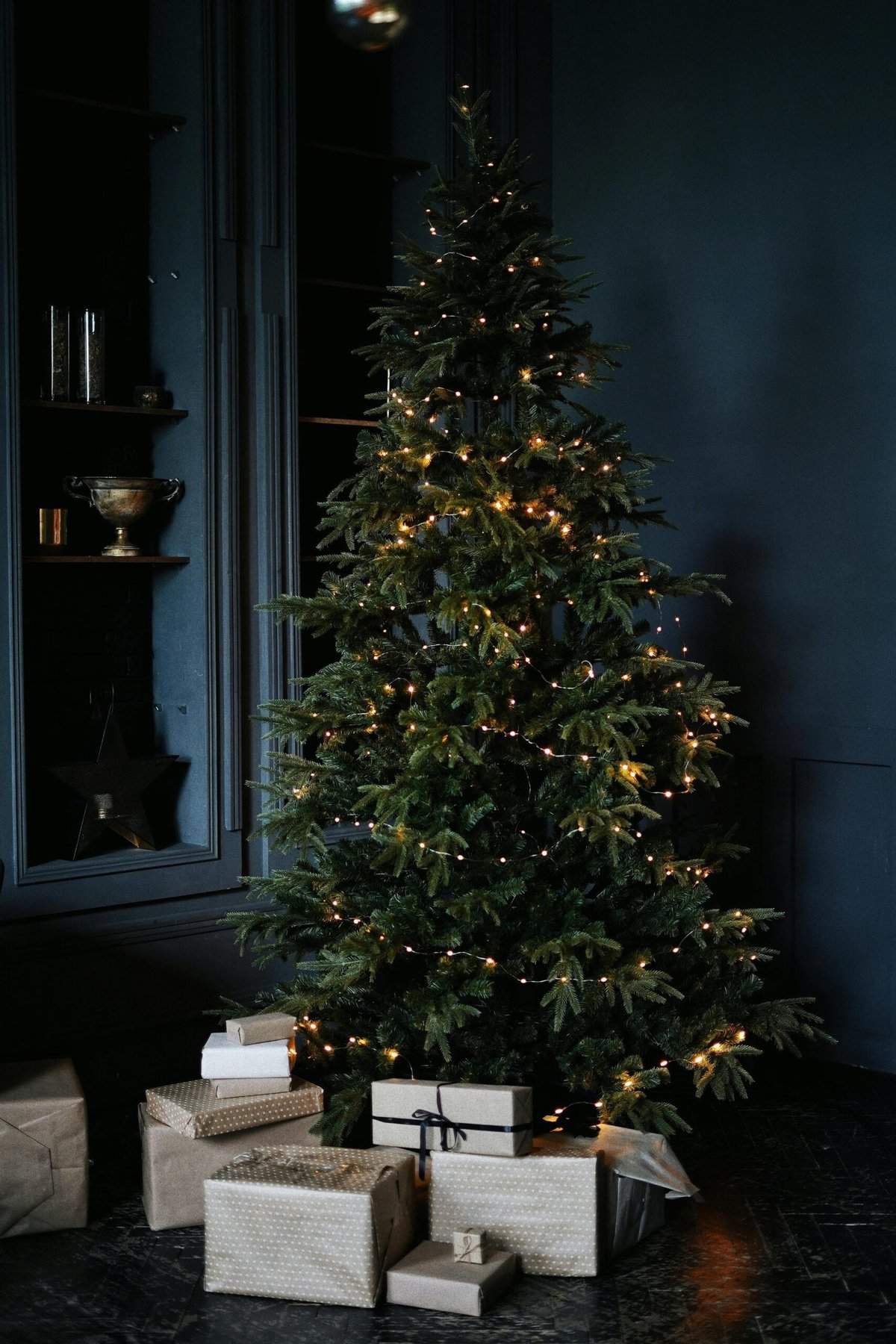Are you looking to add a unique flair to your tapas dishes? In this article, we explore the exciting world of experimenting with presentation styles for Korean-inspired tapas. Discover how you can transform simple ingredients into beautifully arranged plates that not only taste amazing but also look visually stunning. From traditional Korean-inspired plating techniques to modern and innovative approaches, we’ll guide you through the process of elevating your tapas game and impressing your guests with your culinary creations. Get ready to embark on a journey of flavors and aesthetics!

Traditional Korean Presentation Styles
Hanbok Inspired
When it comes to presentation styles for Korean-inspired tapas, one traditional approach is to draw inspiration from the hanbok, the traditional Korean dress. Just like the hanbok showcases vibrant colors and intricate patterns, you can reflect this in your tapas presentation by using brightly colored ingredients and arranging them in a visually pleasing manner. This will not only make your tapas visually appealing but also pay homage to the rich cultural heritage of Korea.
Lotus Leaf Wrapping
Another traditional Korean presentation style is lotus leaf wrapping. In this style, tapas are wrapped in lotus leaves, giving them a unique and visually intriguing appearance. The lotus leaves not only add a touch of elegance but also infuse a subtle aroma into the tapas, enhancing the overall dining experience. This presentation style is not only visually appealing but also adds a layer of authenticity to your Korean-inspired tapas.
Banchan Style
Banchan refers to the side dishes that are traditionally served alongside a main meal in Korean cuisine. Incorporating the banchan style into your tapas presentation involves serving a variety of small plates with different flavors, textures, and colors. This allows your guests to experience a diverse range of flavors in one sitting. By using an assortment of small plates and arranging them in an aesthetically pleasing manner, you can recreate the banchan style and create a visually stunning tapas spread.
Modern Interpretations
Fusion with Other Cuisines
One way to experiment with presentation styles for Korean-inspired tapas is to infuse them with elements from other cuisines. This modern interpretation allows you to create a fusion of flavors and presentation styles, resulting in unique and exciting tapas dishes. For example, you can combine Korean flavors with Mexican ingredients and serve mini Korean-inspired tacos or incorporate Japanese flavors and techniques to create Korean-inspired sushi rolls. The possibilities are endless when it comes to fusion cuisine, and it allows you to explore different presentation styles and push the boundaries of traditional Korean tapas.
Deconstructed Tapas
Deconstruction is a popular trend in the culinary world, and it can be applied to Korean-inspired tapas as well. Instead of serving a fully assembled dish, deconstructed tapas involve presenting the various components of a dish separately, allowing the diners to create their own bite-sized combinations. This not only adds an interactive element to the dining experience but also gives you the opportunity to showcase the different ingredients and flavors in a visually appealing way. By arranging the components in an artistic and organized manner, you can create a visually stunning deconstructed tapas presentation.
Minimalistic Approach
In recent years, a minimalistic approach to food presentation has gained popularity. This style focuses on simplicity, clean lines, and minimal decoration. Applying this approach to your Korean-inspired tapas can create a visually striking presentation. By using negative space and arranging the tapas in a clean and organized manner, you can allow the vibrant colors and textures of the ingredients to take center stage. This minimalist style not only highlights the natural beauty of the tapas but also adds a modern and sophisticated touch to your presentation.

Incorporating Korean Elements
Using Gochujang (Korean Chili Paste)
Gochujang, a fermented Korean chili paste, is a staple ingredient in Korean cuisine. It adds a depth of flavor and a subtle spiciness to dishes. Incorporating gochujang into your tapas not only infuses them with a distinct Korean flavor but also adds a rich red color to your presentation. From using it as a base for marinades to incorporating it into dressings or dips, gochujang can be a versatile ingredient for creating Korean-inspired tapas with a bold and vibrant presentation.
Korean Ingredients and Spices
To truly capture the essence of Korean cuisine in your tapas presentation, it is essential to use authentic Korean ingredients and spices. Incorporating ingredients like soy sauce, sesame oil, garlic, ginger, and Korean chili flakes (gochugaru) can add the unique flavors and aromas that are characteristic of Korean cuisine. By using these ingredients, you can create tapas that are not only visually appealing but also authentic in taste, allowing your guests to experience the true essence of Korean cuisine.
Garnishing with Kimchi
Kimchi, a fermented vegetable dish, is a quintessential part of Korean cuisine. It adds a burst of flavor, tanginess, and a vibrant red color to any dish. Garnishing your Korean-inspired tapas with kimchi can elevate their presentation by adding a pop of color and a touch of authenticity. Whether it’s a traditional cabbage kimchi or a variation with radishes or cucumbers, adding kimchi as a garnish can make your tapas visually appealing and add a complementary flavor to the overall dish.
Playing with Colors and Textures
Vibrant Color Palate
Korean cuisine is known for its vibrant colors, and this can be reflected in your tapas presentation as well. By using a variety of colorful ingredients, such as different types of vegetables, fruits, and even edible flowers, you can create a visually stunning tapas spread. Incorporating a range of colors, from the vibrant red of gochujang to the bright green of vegetables, can make your tapas visually appealing and enticing.
Contrasting Textures
In addition to vibrant colors, Korean cuisine also offers a diverse range of textures. From crispy fried chicken to silky tofu, Korean-inspired tapas can incorporate a variety of textures, adding depth and interest to the overall presentation. By combining crispy, crunchy, chewy, and creamy textures in one dish or creating a contrast between different tapas, you can create a visually dynamic spread that entices both the eyes and the palate.
Visual Balance
Creating a visually balanced tapas presentation involves considering the arrangement and placement of each element on the plate. By distributing the colors, shapes, and sizes of the tapas evenly, you can achieve a visually pleasing balance. This can be done by strategically placing contrasting or complementary elements next to each other or creating a focal point with a larger or more visually striking tapas. The key is to create a harmonious balance that is visually appealing and invites the diner to explore and enjoy the tapas.

Using Unique Serving Vessels
Traditional Ceramic Plates
To add an authentic touch to your Korean-inspired tapas presentation, consider using traditional ceramic plates. Traditional Korean ceramic plates, with their unique patterns and designs, can add a visual interest and a touch of cultural heritage to your tapas spread. By presenting your tapas on these plates, you can create a sense of authenticity and pay homage to the traditional Korean dining experience.
Bamboo Steamer Baskets
Bamboo steamer baskets are commonly used in Asian cuisine, including Korean cuisine, for steaming dumplings and buns. Incorporating these baskets into your tapas presentation can add an element of surprise and intrigue. By placing your tapas in individual bamboo steamer baskets, you can create a visually appealing and unique presentation that mimics the experience of enjoying street food in Korea.
Stone Bowls
In Korean cuisine, stone bowls are often used for serving hot dishes like bibimbap, a rice dish with various toppings. Incorporating stone bowls into your tapas presentation can add a rustic and authentic feel. By serving your tapas in individual stone bowls, you can enhance the visual appeal and create a sense of warmth and comfort, reminiscent of traditional Korean dining.
Interactive Presentation Styles
Tabletop Barbecue Experience
A popular interactive presentation style for Korean cuisine is the tabletop barbecue experience. This involves grilling the meat or vegetables at the table, allowing diners to be part of the cooking process. To adapt this style for your tapas presentation, you can serve bite-sized pieces of grilled meat or vegetables and provide small tabletop grills or hot stones for your guests to grill their own tapas. This not only adds an element of fun and interactivity but also allows your guests to customize their tapas to their liking.
Build-Your-Own Tapas Stations
Build-your-own stations allow your guests to be creative and customize their tapas according to their preferences. Set up a variety of ingredients, sauces, and condiments, and let your guests assemble their own tapas. This not only adds an interactive element to the dining experience but also allows your guests to experiment with different flavor combinations and presentation styles. Provide small plates, bowls, and serving utensils, and let your guests unleash their creativity.
Hot Stone Cooking
Hot stone cooking is another interactive presentation style that can be incorporated into your Korean-inspired tapas. This involves heating stones and using them to cook small portions of meat or seafood at the table. By serving raw or partially cooked tapas and providing hot stones, you can create a unique and interactive dining experience. Your guests can cook their tapas to their desired level of doneness, adding a personalized touch to the presentation and allowing them to fully engage with the flavors and textures of the tapas.

Creative Plating Techniques
Food Art and Sculptures
One way to experiment with presentation styles for Korean-inspired tapas is to create food art and sculptures. Use the ingredients to construct visually appealing designs, shapes, or patterns on the plate. This can be done by stacking, arranging, or sculpting the components of your tapas to create visually striking and aesthetically pleasing arrangements. By using your creativity and artistic skills, you can turn your tapas into edible works of art.
Stacking and Layering
Stacking and layering your tapas is a simple yet effective way to create visual interest and height on the plate. By layering different components of a tapa or stacking them vertically, you can create a visually striking presentation that is appealing to the eye. This technique allows you to play with different colors, textures, and flavors, creating a visually dynamic and enticing tapas plate.
Microgreens and Edible Flowers
Microgreens and edible flowers are not only visually appealing but also add a fresh and delicate flavor to dishes. By incorporating these small and vibrant greens or flowers into your tapas presentation, you can create a visually stunning and visually appealing plate. Use them as garnishes, place them strategically on the plate, or scatter them around the tapas to add a touch of elegance and sophistication to your presentation.
Incorporating Korean Tableware
Traditional Korean Cutlery
Using traditional Korean cutlery can add an authentic touch to your tapas presentation. Traditional Korean chopsticks, known as jeotgarak, are flat and made of metal or wood. By using these chopsticks, you can create a visually striking contrast with the colorful and vibrant tapas. Additionally, traditional Korean spoons, known as sujeo, can be used to serve soups or stews. Incorporating these traditional Korean utensils into your tapas presentation not only adds an element of authenticity but also enhances the overall dining experience.
Authentic Tea Sets
Tea plays a significant role in Korean culture, and incorporating a traditional Korean tea set into your tapas presentation can add a touch of elegance and authenticity. Serve a Korean tea alongside your tapas and use traditional tea cups and teapots to enhance the visual appeal. By incorporating the ritual of tea into your tapas presentation, you can create a holistic and immersive dining experience that pays homage to Korean traditions.
Chopstick Rests
Chopstick rests, also known as hashioki in Japanese, are small ceramic or wooden holders designed to hold chopsticks when they are not in use. Incorporating chopstick rests into your tapas presentation can add a thoughtful and elegant touch. By placing them next to each tapa, you provide a designated spot for the chopsticks, enhancing the visual appeal and promoting a more refined dining experience.

Influences from Street Food Culture
Mimicking Street Food Stalls
Street food is an integral part of Korean food culture, and you can draw inspiration from it when experimenting with presentation styles for Korean-inspired tapas. One way to mimic the street food experience is by creating mini food stalls or carts to serve your tapas. Using wooden or metal trays, small bowls, and vibrant signage, you can recreate the bustling and colorful atmosphere of a Korean street food market, enhancing the overall experience for your guests.
Paper Wrapping and Takeout Boxes
Another way to incorporate street food culture into your tapas presentation is by using paper wrapping or takeout boxes. In Korean street food markets, many snacks and tapas are served in paper cones or wrapped in paper for easy and mess-free consumption. By serving your tapas in paper wraps or takeout boxes, you can create a casual and street food-inspired presentation that adds a touch of authenticity to your Korean-inspired tapas.
Skewers and Stick Presentation
Skewers and stick presentation is a popular street food style that can be adapted to your tapas presentation. Skewering your tapas ingredients and serving them on sticks not only makes them portable and easy to eat but also adds a playful and casual element to the presentation. Whether it’s skewered meat, vegetables, or even dessert tapas, this presentation style brings the vibrant and dynamic street food culture to your dining table.
Playing with Temperature Contrasts
Hot and Cold Tapas Combos
Playing with temperature contrasts can add an exciting dimension to your tapas presentation. By pairing hot tapas with cold tapas on the same plate, you create a sensory experience that stimulates both the taste buds and the visual senses. For example, serving a hot grilled meat tapa alongside a cold, refreshing salad tapa can create a visually appealing contrast of colors and textures, as well as a dynamic interplay of flavors.
Serving Warm Tapas on a Chilled Plate
An interesting way to experiment with temperature contrasts is by serving warm tapas on a chilled plate. Chilling the plate beforehand creates a contrast between the warm tapas and the cool plate, enhancing the visual appeal and adding an unexpected element to the presentation. This presentation style not only keeps the warm tapas at an ideal temperature but also adds a touch of sophistication and creativity to your tapas spread.
Temperature-Controlled Presentation
For a more advanced approach, you can experiment with temperature-controlled presentation for your tapas. This involves using specialized equipment such as chilled or heated serving platters, plates, or bowls to ensure that the tapas are served at their optimal temperature. By controlling the temperature of the serving vessels, you can enhance the flavors of the tapas and create a visually stunning presentation that showcases the careful attention to detail in your presentation.
Embrace the World of Korean-inspired Tapas Presentations!
Experimenting with presentation styles for Korean-inspired tapas allows you to showcase your creativity, pay homage to the rich Korean culinary heritage, and deliver an unforgettable dining experience. From traditional Korean presentation styles to modern interpretations, the possibilities are endless when it comes to creating visually stunning and appetizing tapas spreads. So go ahead, embrace the world of Korean-inspired tapas presentations, and let your creativity unfold to delight your guests.
